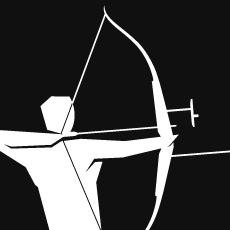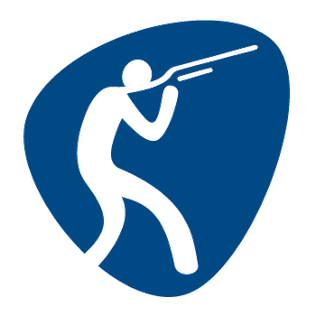
Master Chief Petty Officer Sanjeev Rajput is an Arjuna Awardee Indian sport shooter from Yamuna Nagar, Haryana. He was a retired Junior Commissioned Officer in Indian Navy.
The 2009 ISSF World Cup is the twenty-fourth annual edition of the ISSF World Cup in the Olympic shooting events, governed by the International Shooting Sport Federation. Four qualification competitions are held in each event, spanning from April to June, and the best shooters will qualify for the ISSF World Cup Final, which will take place in China in October. The shotgun finals were originally scheduled for Istanbul, but were later moved to the Beijing Shooting Range Clay Target Field, while the rifle and pistol events will be held at a range in Wuxi. Apart from those who qualify through the 2009 World Cup competitions, the defending champions and the reigning Olympic champions will also be invited to the final. The host country may also participate with at least two shooters regardless of qualification.

The archery events at the 2012 Olympic Games in London were held over an eight-day period from 27 July to 3 August. Four events took place, all being staged at Lord's Cricket Ground in front of temporary stands built to accommodate up to 6,500 spectators.

Croatia competed at the 2012 Summer Olympics in London, United Kingdom, from 27 July to 12 August 2012. This was the nation's sixth consecutive appearance at the Summer Olympics.

Sweden competed at the 2012 Summer Olympics in London, from 25 July to 12 August 2012. Swedish athletes have competed at every edition of the Summer Olympic Games in the modern era, except for the 1904 Summer Olympics in St. Louis. The Swedish Olympic Committee sent a total of 134 athletes to the Games, 55 men and 79 women, to compete in 20 sports. For the second consecutive time in its Olympic history, Sweden was represented by more female than male athletes.

Greece competed at the 2012 Summer Olympics in London, United Kingdom, from 27 July to 12 August 2012. The Hellenic Olympic Committee sent a total of 103 athletes to the Games in London, 65 men and 38 women, to compete in 19 sports. Men's water polo was the only team event in which Greece was represented at these Olympic Games.

Denmark competed at the 2012 Summer Olympics in London, from 27 July to 12 August 2012. The National Olympic Committee and Sports Confederation of Denmark sent the nation's second largest delegation to the Games after the 1996 Summer Olympics in Atlanta. A total of 113 athletes, 63 men and 50 women, competed in 17 sports, although two additional athletes played as team reserves. Handball was the only team-based sport in which Denmark was represented in at these Olympic games.

The men's ISSF 50 meter pistol event at the 2012 Olympic Games took place on 5 August 2012 at the Royal Artillery Barracks. There were 38 competitors from 27 nations. The event was won by Jin Jong-oh of South Korea, the second of his three consecutive victories in the free pistol. He was the first shooter to win two individual free pistol gold medals. It was his third medal in the event, making him the fourth man to earn three free pistol medals. His countryman Choi Young-rae took silver, the first time since 1976 that a nation had finished 1–2 in the event. Chinese shooter Wang Zhiwei received bronze.

The men's ISSF 25 meter rapid fire pistol event at the 2012 Olympic Games was held on 2 and 3 August 2012 at the Royal Artillery Barracks. There were 18 competitors from 13 nations. The event was won by Leuris Pupo of Cuba. Silver went to Vijay Kumar of India, while Ding Feng of China took bronze. It was the first medal in the event for all three nations. Ralf Schumann missed the final for the first time; he had reached the final in the previous six Games.

The men's trap event at the 2012 Olympic Games took place on 5 and 6 August 2012 at the Royal Artillery Barracks. There were 34 competitors from 27 nations. The event was won by Giovanni Cernogoraz of Croatia, the nation's first medal in the men's trap. Massimo Fabbrizi of Italy took silver, the third consecutive silver and fourth Games on the podium for Italy. Kuwait, like Croatia, earned its first medal in the men's trap; Fehaid Al-Deehani took bronze.

Shooting competitions at the 2016 Summer Olympics in Rio de Janeiro took place from 6 to 14 August at the National Shooting Center in Deodoro. A maximum of 390 athletes were able to compete in the fifteen events across these Games. The event format was similar to 2012, although there were significant changes to the rules and guidelines of the competition.

Shooting competitions at the 2020 Summer Olympics in Tokyo were originally scheduled from 25 July to 3 August 2020, due to the postponement of the Summer Olympics to 2021, the rescheduled dates were on 24 July to 2 August 2021 at the Asaka Shooting Range. Unlike in 2016, the number of shooters competing across fifteen events at these Games had been reduced from 390 to 360, with an equal distribution between men and women. Furthermore, several significant changes were instituted in the Olympic shooting program, including the substitution of three male-only events, with the mixed team competitions.
This article details the qualifying phase for shooting at the 2016 Summer Olympics. 366 quota places for the Games are entitled to the shooters coming from their respective NOCs, based on the results at designated ISSF supervised Championships subjected to the ISSF rules from August 1, 2014, to March 31, 2016, while the remaining twenty-four are available to the eligible NOCs under the Tripartite Commission Invitation to get a total quota of 390. Host nation Brazil has been guaranteed nine quota places with one in each of the following events: 50 m rifle prone, 25 m rapid fire pistol, 10 m air pistol, 10 m air rifle (women), trap, and skeet.

The men's ISSF 25 meter rapid fire pistol event at the 2016 Olympic Games took place on 12 and 13 August 2016 at the National Shooting Center. There were 26 competitors from 20 nations. The event was won by Christian Reitz of Germany, the nation's first victory in the event and fifth overall. Reitz, the bronze medalist in 2008, was the 12th man to win multiple medals in the rapid fire pistol. Jean Quiquampoix of France took silver, the nation's first medal in the event since 1900. China took bronze, just as in 2012, this time by Li Yuehong.

The men's trap at the 2016 Summer Olympics took place on 7–8 August 2016 at the National Shooting Center. There were 33 competitors from 24 nations.

Bulgaria competed at the 2016 Summer Olympics in Rio de Janeiro, Brazil, from 5 to 21 August 2016. Bulgaria made their official debut at the 1896 Summer Olympics in Athens. Bulgarian athletes had appeared in every edition of the Summer Olympics since 1924, except for three occasions: the 1948 Summer Olympics in London, and the 1932 and 1984 Summer Olympics in Los Angeles because of Bulgaria's actions in World War II, the worldwide Great Depression and the Soviet boycott, respectively.

Georgia competed at the 2016 Summer Olympics in Rio de Janeiro, Brazil, from 5 to 21 August 2016. This was the nation's sixth consecutive appearance at the Summer Olympics in the post-Soviet era.

The men's ISSF 25 meter rapid fire pistol event at the 2020 Summer Olympics took place on 1 and 2 August 2021 at the Asaka Shooting Range. Approximately 30 shooters from 20 nations are expected to compete in the rapid fire pistol, with the precise number depending on how many shooters compete in multiple events.

The men's ISSF Olympic trap event at the 2020 Summer Olympics took place on 28 and 29 July 2021 at the Asaka Shooting Range. Approximately 30 sport shooters from 20 nations are expected to compete in the trap, with the precise number depending on how many shooters compete in multiple events.

Shooting competitions at the 2024 Summer Olympics in Paris took place from 27 July to 5 August 2024 at the National Shooting Centre in Châteauroux. The number of shooters competing across fifteen events was reduced from 360 at the previous Games to 340, with an equal distribution between men and women. Furthermore, several significant changes were instituted in the Olympic shooting program, including the new final format and the substitution of the mixed team trap competitions with the mixed team skeet.



















